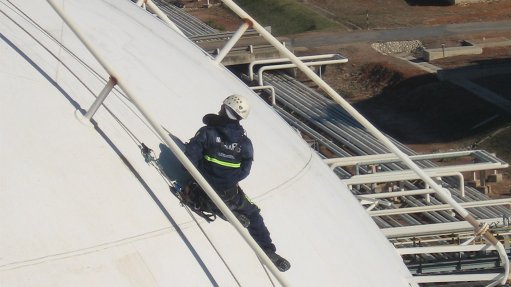
ACCESS REMAINS COSTLY Petrochemical plants are spending a disproportionate amount of their maintenance budgets trying to access areas that require maintenance
Using rope access for legally required maintenance tasks at large petrochemicals plants can result in significant savings for operations in terms of maintenance and associated downtime.
Rope-access specialist Skyriders marketing manager Mark Zinn tells Engineering News that petrochemicals plants are spending a disproportionate amount of their maintenance budgets on trying to access areas that require maintenance. The traditional means of access – using scaffolding, cherry pickers or larger cranes with man-cages – cost more than the maintenance work required, he says.
“Petrochemicals plants will often spend a considerable yet disproportionate portion of their maintenance budgets to access areas that require relatively simple maintenance to be carried out.”
Zinn emphasises, however, that the rope- access services provided by Skyriders significantly reduce maintenance downtime, and access costs for petrochemicals companies. He says rope access eliminates the need to spend time and labour on constructing scaffolds, mobilising cranes and establishing site access.
Rope access also allows for faster maintenance jobs and much smaller specialised maintenance teams, he adds. For example, Skyriders was contracted to replace a thermocouple on the 60-m-high flare stack for a large petrochemicals company, in Mpumalanga. Skyriders completed the task in a 12-hour shift, whereas traditional access methods would have resulted in the replacement taking between three to four days.
“The alternative method of accessing the thermocouple would have been to use a crane with a man-cage. This would have meant time and money wasted on mobilising a crane, ground preparation, establishing the crane and then completing the scope of work within a 12-hour shift.”
Skyriders states that using rope access further decreases plant downtime by having a team of technicians who are acquainted with the plants on standby for petrochemicals clients. As a result, Skyriders can respond to unforeseen breakdowns and call-outs within a few hours.
Safety during Maintenance
Zinn states that Skyriders has experienced an overwhelming demand from the petrochemicals industry for a reliable, safe and cost-effective approach to plant maintenance.
He assures that Skyriders understands that safety is also a major concern for South Africa’s petrochemicals companies. Subsequently, Skyriders has focused on achieving the highest safety standards. The company boasts ISO 9001:2015, OHSAS 18001:2007, and ISO 14001:2015 environmental management certifications which they have maintained since 2013.
“It is important for us to align ourselves with exactly the same standards as our client in terms of quality, health and safety, and environmental management. We often find that our clients have specific processes and procedures that we are required to follow, therefore, it helps if we are all on the same page from the get-go.”
Zinn emphasises that the safety-conscious and process-driven nature of the petrochemicals industry filters through to its entire supply chain and all of the specialist companies and service providers it deals with, which has the added benefit of raising standards in the industry as a whole.
The petrochemicals industry has been harrowed by unstable oil prices in recent years, which has consequently brought into focus the industry’s need for safe, reliable and, most significantly, cost-effective maintenance solutions, Zinn concludes.